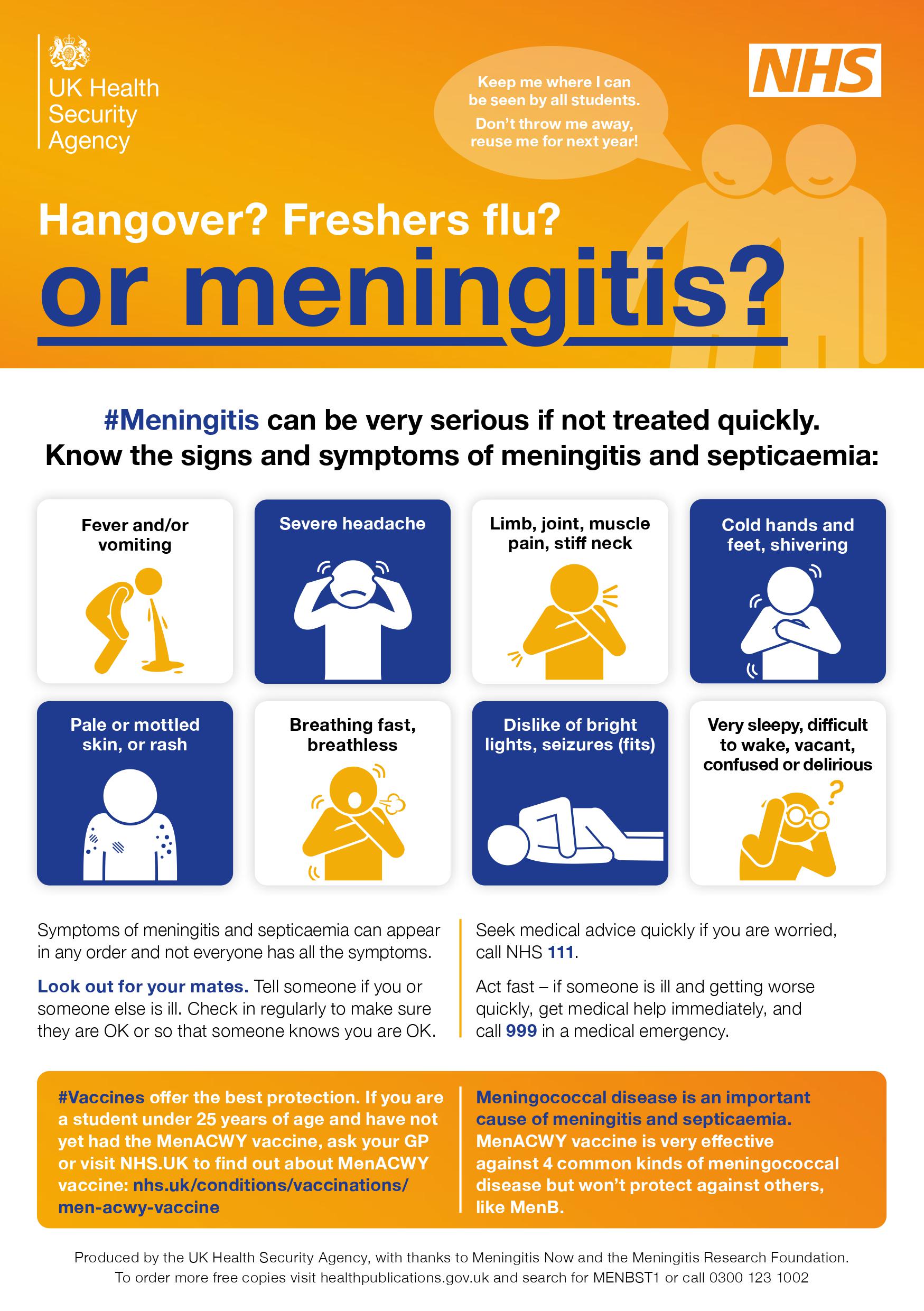Support
Are you protected from meningitis and septicaemia?
Students in Higher Education, particularly freshers, are known to be at increased risk of meningitis and septicaemia. It's really important that you know the symptoms, how to protect yourself and what to do if you think you or a friend may have it.
What is meningitis and septicaemia?
Meningococcal disease is a cause of meningitis and septicaemia (blood poisoning). Being in confined environments with close contact, such as university halls, hostels when travelling, or attending festivals, increase the chances of infection if unprotected.
Meningitis and septicaemia develops quickly and can leave people with life changing disabilities or can be fatal. Unfortunately there's been an increase the MenW strain which is particular serious as it can be difficult to diagnose. This is because the strain has been associated with symptoms less frequently seen with meningococcal disease e.g. severe diarrhoea and vomiting.
What are the symptoms?
- A blotchy rash that doesn't fade when a glass is rolled over it
- Fever
- Aching muscles and joints
- A stiff neck
(see more symptoms below)
How can you protect yourself from meningitis and septicaemia?
Register with a local GP and get the MenACWY vaccine (as well as your MMR vaccine). It's a single injection to the upper arm and it protects against four different kinds of the meningococcal bacteria that cause meningitis and septicaemia: A, C, W and Y.
- The vaccine is free to students who are going to uni for the first time up until their 25th birthday
- Any student born after 1 September 1996 who missed the MenACWY vaccine at secondary school can have the vaccine before their 25th birthday
To get the vaccine, you just need to sign up to your local GP. You can register with your local GP here.
The vaccine is very effective in preventing cases of Meningitis A,C,W and Y disease but does not protect against other types of meningitis, like MenB, so it is important to know the signs and how and when to seek help if someone is ill.
What to do if you suspect meningitis or septicaemia?
If you are concerned, seek medical advice quickly and call 111 (NHS). If someone is ill and worsening quickly, get medical help immediately by calling 999.

Topics
- Read Next
-
 Safe kitchen checklist
Safe kitchen checklist
 Safe cooking in Halls
Safe cooking in Halls
 Safely using your Air Fryer
Safely using your Air Fryer
 Transitioning from Halls to your new Home
Transitioning from Halls to your new Home
 Ways to make the most of more daylight hours
Ways to make the most of more daylight hours
 Exploring Liverpool: Must Visit Bakeries!
Exploring Liverpool: Must Visit Bakeries!
 Q&A with Liverpool Student Homes
Q&A with Liverpool Student Homes
 Managing your drinking habits
Managing your drinking habits
 Finding housemates to live with next year
Finding housemates to live with next year
 Ollie's top Green Spaces to visit
Ollie's top Green Spaces to visit
- Popular
-
 Halls Facebook Groups 2024/25
Halls Facebook Groups 2024/25
 Halls Postal Address
Halls Postal Address
 Items not permitted in Halls
Items not permitted in Halls
 What to pack
What to pack
 Mentally preparing for University
Mentally preparing for University
 Travelling around the city and to Greenbank
Travelling around the city and to Greenbank
 Liverpool's local must-see markets
Liverpool's local must-see markets
 Shopping in Liverpool
Shopping in Liverpool
 Join your Hall's Student Committee
Join your Hall's Student Committee
 Halls Life: About us
Halls Life: About us


